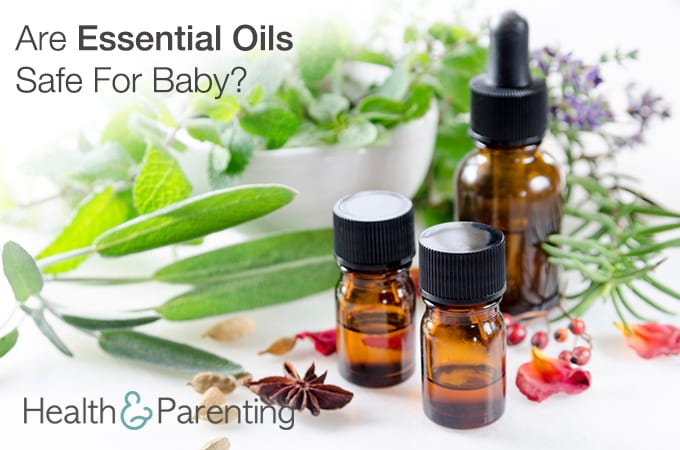Essential oils are everywhere – it seems like every day I read on social media about how great they are. And moms often want to know if specific oils can increase their breastmilk supply, or make their babies less fussy.
Essential oils are the distillation or extraction of oils from plants. They can be used for a number of purposes, one of which is for health and wellness. But just because these oils are derived from the natural world doesn’t necessarily make them safe for use on your baby.
Several factors influence the safety of essential oils, including the quality of the manufacturing process, the chemical composition of the oil itself, and how the oil will be used. For example, if an oil is a known skin irritant but you’re going to use it in a massage oil, you may want to think again. Some essential oils are known skin or mucous membrane irritants, while other can cause sensitivity to the sun. Knowing exactly which oil you’re using, and all of it’s properties, will help you make safe choices for your baby.
Additionally dosages will differ, and will often depend on the age of the person for whom the oil is meant. Babies and young children can be more sensitive to essential oils than adults and some essential oils should be completely avoided for them.
Because there isn’t enough research about the use of essential oils during pregnancy, most experts recommend avoiding using them during the first 3 months of pregnancy due to the possibility transfer to the fetus causing harm. The following essential oils should be avoided altogether during pregnancy: wormwood, rue, oak moss, Lavandula stoechas, camphor, parsley seed, sage, and hyssop.
Some moms may hear that certain essential oils can help with breastmilk production or breast problems. While there is some anecdotal evidence that essential oils can help, there is no scientific evidence as to safety. Experts believe that topical application is unlikely to have an adverse effect on baby unless the oil is applied to the breast, areola or nipple (where baby might ingest it). If a mother uses an essential oil on the breast, she should wash before feeding.
Babies have sensitive skin, and their body’s systems are all immature – so babies won’t react the same way to essential oil as adults. So using caution with essential oils is, well, essential.
Tips for using essential oils safely with your family include:
- Keep in mind that herbal products are not regulated, and the potency and purity can vary from product to product.
- Herbs – and essential oils – can have interactions with other herbs and with medications.
- If using an essential oil on baby’s skin, always use a ‘carrier oil’ and do a patch test to be sure baby doesn’t have an allergic reaction.
- Know what an allergic reaction might look like so you can seek help if your child has one.
- Work with an aromatherapist, naturopath or holistic practitioner to determine the best essential oils for your own baby.
Use of essential oils shouldn’t be a replacement for a visit to the healthcare provider if your baby is sick. Do your research and get to know which oils are recommended for which purposes so you can make informed decisions.
Written by Michelle, childbirth instructor, lactation consultant, and mother to 4 busy kids
This information is not intended to replace the advice of a trained medical doctor. Health & Parenting Ltd disclaims any liability for the decisions you make based on this information, which is provided to you on a general information basis only and not as a substitute for personalized medical advice. All contents copyright © Health & Parenting Ltd 2016. All rights reserved.











